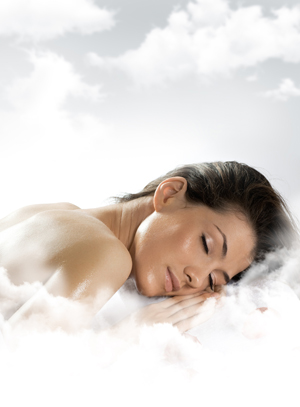It sounds easy: we go to bed, we fall asleep, we wake up refreshed and ready to start another day. Or do we? Why is it sometimes so hard to fall asleep? Why is it that we can wake up feeling more tired and stressed than we did before we went to bed?
There can be many different sleep problems, and not getting enough sleep is just one of them. Some  of us do not get the quality sleep that we need – for example we may wake throughout the night – while for others it could be a case of getting too much sleep – yes, it is true you can have too much!
of us do not get the quality sleep that we need – for example we may wake throughout the night – while for others it could be a case of getting too much sleep – yes, it is true you can have too much!
The way we sleep at night is reflected in how mentally sharp, emotionally balanced and full of energy we are the following day. The way to a better night’s sleep and less daytime fatigue can often be found in our lifestyle. Bedtime habits, schedules and general nightly routine can all influence our sleep, and much of the time just a few adjustments can really help to minimise insomnia and improve the quality of our sleep.
The first thing to find out is how much sleep we need to function at our best. Although sleep quantity varies from person to person, it is generally considered that 7-8 hours is the requirement for most adults.
Unwinding
What can we do before we go to bed to start the process of unwinding? Well, first we can try to step away from our work, children and stresses for at least an hour or two before bedtime, giving our mind and body the chance to de-stress. Then we can allow ourselves a little time to relax: this could involve enjoying a soak in the bath, listening to music or reading a great book. Anything that will allow our minds to drift easily onto things that do not cause us stress. It is a good way to separate ourselves from the worries of the day before we attempt to sleep.
Food and drink
We should try to avoid fatty, rich, heavy meals within two hours of bedtime and most studies recommend not eating after 8pm. A glass of wine in the evening is not going to hurt, but avoid large quantities of alcohol: it might make you fall asleep quickly but it will almost certainly disrupt your sleep later on in the night. Avoid coffee, tea and other stimulating drinks, especially in the late afternoon and evening.
Caffeine-free or non-stimulating warm drinks such as Horlicks or camomile tea before bed can be soothing.
Smoking is also a common cause of poor sleep quality: another reason to give up!
Environment
In the last issue we really focused on creating the perfect sleep environment: a decluttered, quiet and light-free space in which you can just relax. Noise can be very disruptive to a good night’s sleep. We sleep a lot better in a silent room, even if over the years we have learned to sleep through various noises. It is sometimes difficult to eliminate noises such as traffic, animals or other people, but what we can do is mask it with other more soothing sounds: music, a fan or just old-fashioned earplugs.
The bedroom should be dark, as external street lights, computer or TV screens and bedside lamps can all interfere with our body clock. It shouldn’t be too hot or too cold, around 18 C is an adequate temperature.
The quality of the mattress and bedding is also very important. An old beaten up mattress can give us backache and neck pain which will prevent a good night’s sleep and cause a few problems in the day too. Make sure you turn your mattress frequently as the weight of your body can cause dips and hollows and lead to an uneven, uncomfortable sleeping surface.
Getting ready
If you have things to do the following day, prepare; get things ready in advance so that there wont be a mad ‘morning dash’ – and you won’t lie awake fretting about the coming day.
Settle arguments
Don’t go to bed on an argument. Try to sort out differences before you try to sleep. Arguments get your mind working overtime and make sleep much more difficult.
Aromatherapy
Try essential oils: lavender and camomile help with relaxation. You can use these in oil burners (never leave a lit candle) or dab a little onto your pulse points: the back of the wrists, nape of the neck or temples.
Massage
Use essential oils for a massage. Get a loved one to massage your back or feet. Even if they are inexperienced just a gentle, loving rub can work wonders.
Consistency
Go to bed at the same time every night. Set bedtime as the time when you are normally tired, in order not to toss and turn in bed before falling asleep. Try to keep this routine even on holiday and at weekends (although it’s tempting to stay up sometimes!)
When making changes to your routine, do it gradually. You should be able to wake up at the same time each day, without an alarm (if you need an alarm, it may indicate that you are not getting enough sleep).
Further information
If, after trying everything, you still have problems sleeping, or are consistently tired during the day, you may have a sleeping disorder and wish to seek medical advice. GPs are always a good place to start. Further help and information can also be found on the following websites:





